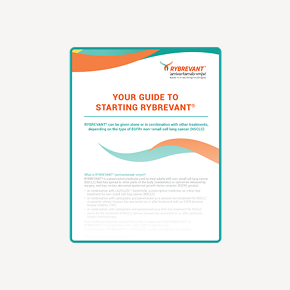Your care team will continuously support you throughout treatment
It’s important to tell your care team about side effects right away, if you:
Your experience may vary. If you experience any of the following symptoms of side effects, tell your doctor right away.
Use a treatment journal to document how you're feeling throughout treatment. You can download the journal here.
Possible serious side effects of RYBREVANT® + chemotherapy include:
Infusion-related reactions
-related reactions are common but can be severe or serious and can include life-threatening (anaphylaxis) allergic reaction. Most occur during the first infusion.
Tell your doctor right away if you experience:
- Shortness of breath, difficulty breathing, or wheezing
- Chest discomfort
- Swelling of your eyes, lips, or tongue
- Fever
- Chills
- Numbness of the tongue, lips, cheeks, or gums
- Flushing
- Skin rash, hives, or itching
- Nausea or vomiting
- Stomach cramps
- Lightheadedness, dizziness, or fainting
- Headache
- Shortness of breath, difficulty breathing, or wheezing
- Flushing
- Chest discomfort
- Skin rash, hives, or itching
- Swelling of your eyes, lips, or tongue
- Nausea or vomiting
- Fever
- Stomach cramps
- Chills
- Lightheadedness, dizziness, or fainting
- Numbness of the tongue, lips, cheeks, or gums
- Headache
If you experience an infusion-related reaction: Your treatment team may adjust or pause your infusion dosing and timing to help manage the reaction.
Lung problems
RYBREVANT® may cause lung problems that may lead to death. Symptoms of lung problems may be similar to those from your lung cancer.
Tell your doctor right away if you experience any new or worsening lung symptoms, including:
- Shortness of breath
- Cough
- Fever

Skin problems
You may experience severe rash.
Tell your doctor right away if you experience:
- Blisters
- Peeling
- Skin pain and sores
- Redness
- Raised, acne-like bumps
- Itching
- Dry skin
If you experience skin problems: Your doctor may treat you with a medicine(s) or send you to see a skin specialist (dermatologist).
What you can do: Taking certain steps can help lower your risk of skin-related side effects. Learn more here. Or, click here for a downloadable guide of tips and reminders to help throughout treatment.
Eye problems
You may experience eye problems.
Tell your doctor right away if you experience:
- Eye pain
- Inflammation of eye lids
- Dry eyes
- Eye redness
- Blurred vision
- Changes in vision
- Itchy eyes
- Excessive tearing
- Sensitivity to light
- Eye pain
- Inflammation of eye lids
- Dry eyes
- Eye redness
- Sensitivity to light
- Blurred vision
- Changes in vision
- Itchy eyes
- Excessive tearing
If you experience eye problems: Your doctor may send you to see an eye specialist (ophthalmologist).
What you can do: You should not use contact lenses until your eye symptoms are checked by a doctor.
Harm to your unborn baby
RYBREVANT® can harm your unborn baby.
Tell your healthcare provider right away if you become pregnant or think you might be pregnant.
What you can do: If you are able to become pregnant, you should use effective birth control during treatment and for 3 months after your final dose of RYBREVANT®.
The most common side effects of RYBREVANT® + chemotherapy include:
- Rash
- Infected skin around the nail
- Feeling very tired
- Nausea
- Sores in the mouth
- Constipation
- Swelling of hands, ankles, feet, face, or all of your body
- Decreased appetite
- Muscle and joint pain
- Vomiting
- COVID-19
- Changes in certain blood tests
Your care team can help prevent or manage side effects to help you stay on treatment.
Chemotherapy = carboplatin + pemetrexed
EGFR+ = mutated epidermal growth factor receptor; NSCLC = non–small cell lung cancer
Always tell your care team if you experience side effects, so you can help manage them together.


Savings & support
Once prescribed a RYBREVANT®-based treatment, connect with a Care Navigator for your support needs.



